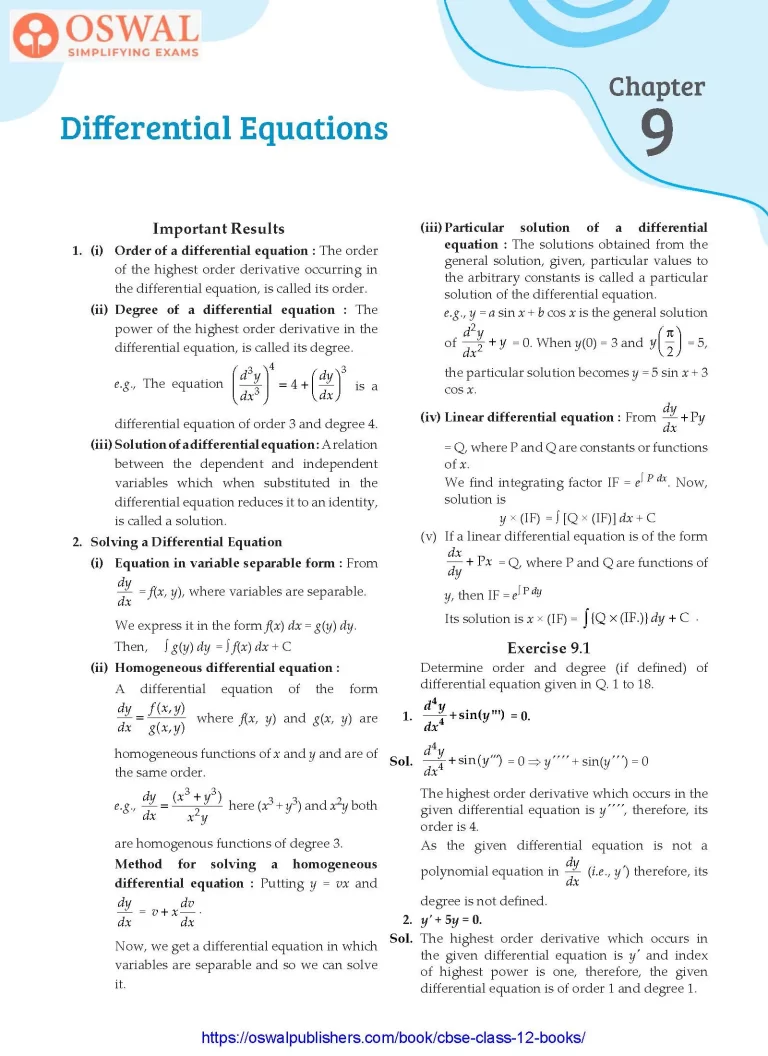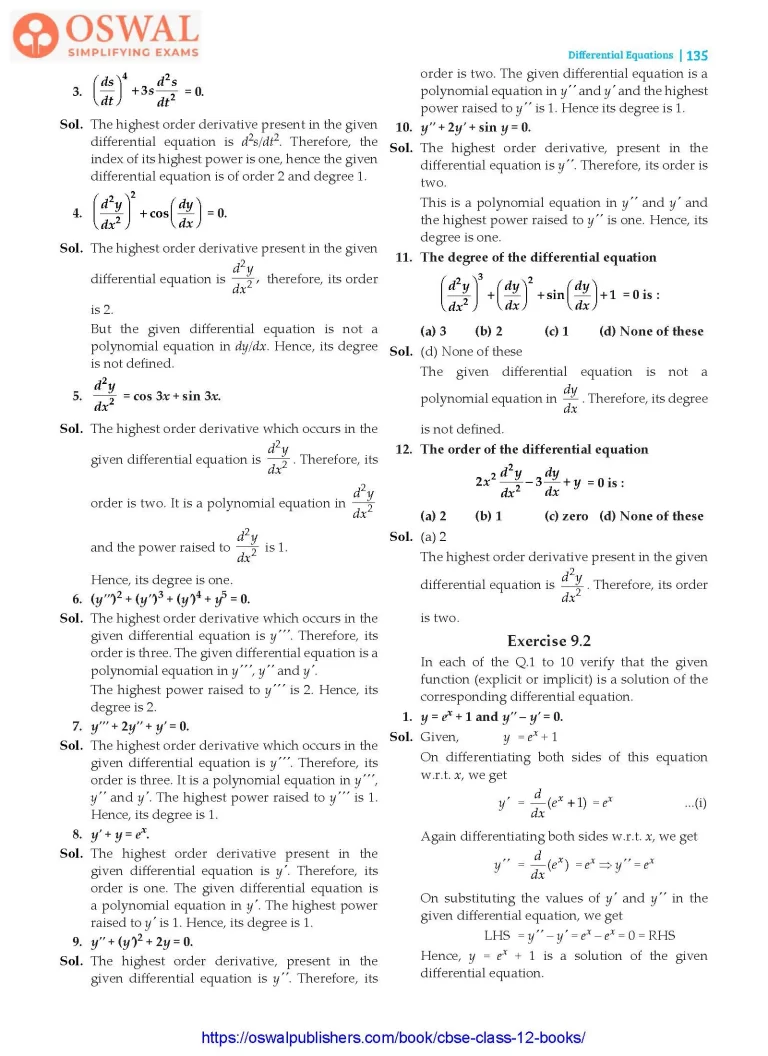NCERT Solutions for Class 12 Maths Chapter 9 - Differential Equations - Exercise 9.1


Access Exercises of Class 12 Maths Chapter 9 – Differential Equations
Exercise 9.1 Solutions 12 Questions
Exercise 9.2 Solutions 12 Questions
Exercise 9.3 Solutions 12 Questions
Exercise 9.4 Solutions 23 Questions
Exercise 9.5 Solutions 17 Questions
Exercise 9.6 Solutions 19 Questions
Miscellaneous Exercise on Chapter 9 Solutions 18 Questions
Exercise 9.1
Determine order and degree (if defined) of differential equation given in Q. 1 to 18.
$$\textbf{1.\space}\frac{\textbf{d}^{\textbf{4}}\textbf{y}}{\textbf{dx}^{\textbf{4}}} \textbf{+ sin}\textbf{(y"") = 0}\\\textbf{Sol.\space}\frac{d^{4}y}{dx^{4}} + \text{sin (y"")}=0\\\Rarr\space y"" + \text{sin(y"")}=0$$
The highest order derivative which occurs in the given differential equation is y'''', therefore, its order is 4.
As the given differential equation is not a polynomial equation in
$$\frac{dy}{dx}\space(i.e., y')\space\text{therefore, its degree}\\\text{is not defined.}$$
2. y' + 5y = 0.
Sol. The highest order derivative which occurs in the given differential equation is y' and index of highest power is one, therefore, the given differential equation is of order 1 and degree 1.
$$\textbf{3.\space}\bigg(\frac{\textbf{ds}}{\textbf{dt}}\bigg)^{\textbf{4}}\textbf{+ 3s}\frac{\textbf{d}^{\textbf{2}}\textbf{s}}{\textbf{dt}^{\textbf{2}}}\textbf{= 0.}$$
Sol. The highest order derivative present in the given differential equation is d2s/dt2. Therefore, the index of its highest power is one, hence the given differential equation is of order 2 and degree 1.
$$\textbf{4.\space}\bigg(\frac{\textbf{d}^{\textbf{2}}\textbf{y}}{\textbf{dx}^{\textbf{2}}}\bigg)^{\textbf{2}} \textbf{+ cos}\bigg(\frac{\textbf{dy}}{\textbf{dx}}\bigg)\textbf{= 0.}$$
Sol. The highest order derivative present in the given differential equation is
$$\frac{d^{2}y}{dx^{2}},\space\text{therefore, its order is 2.}$$
But the given differential equation is not a polynomial equation in dy/dx. Hence, its degree is not defined.
$$\textbf{5.\space}\frac{\textbf{d}^{\textbf{2}}\textbf{y}}{\textbf{dx}^{\textbf{2}}}\textbf{= cos 3x + sin 3x.} $$
Sol. The highest order derivative which occurs in the given differential equation is
$$\frac{d^{2}y}{dx^{2}}.\space\text{Therefore, its order is two.}\\\text{It is a polynomial equation in}\frac{d^{2}y}{dx^{2}}\\\text{and the power raised to}\frac{d^{2}y}{dx^{2}}\space\text{is 1.}$$
Hence, its degree is one.
6. (y''')2 + (y'')3 + (y')4 + y5 = 0.
Sol. The highest order derivative which occurs in the given differential equation is y'''. Therefore, its order is three. The given differential equation is a polynomial equation in y''', y'' and y'.
The highest power raised to y''' is 2. Hence, its degree is 2.
7. y''' + 2y'' + y' = 0.
Sol. The highest order derivative which occurs in the given differential equation is y'''. Therefore, its order is three. It is a polynomial equation in y''', y'' and y'. The highest power raised to y''' is 1. Hence, its degree is 1.
8. y' + y = ex.
Sol. The highest order derivative present in the given differential equation is y'. Therefore, its order is one. The given differential equation is a polynomial equation in y'. The highest power raised to y' is 1. Hence, its degree is 1.
9. y'' + (y')2 + 2y = 0.
Sol. The highest order derivative, present in the given differential equation is y''. Therefore, its order is two. The given differential equation is a polynomial equation in y'' and y' and the highest power raised to y'' is 1. Hence its degree is 1.
10. y'' + 2y' + sin y = 0.
Sol. The highest order derivative, present in the differential equation is y''. Therefore, its order is two.
This is a polynomial equation in y'' and y' and the highest power raised to y'' is one. Hence, its degree is one.
11. The degree of the differential equation
$$\bigg(\frac{\textbf{d}^{\textbf{2}}\textbf{y}}{\textbf{dx}^{\textbf{2}}}\bigg) \textbf{+} \bigg(\frac{\textbf{dy}}{\textbf{dx}}\bigg)^{2} \textbf{+ sin}\bigg(\frac{\textbf{dy}}{\textbf{dx}}\bigg)\textbf{+1}\textbf{= 0}\space\textbf{is :}$$
(a) 3 (b) 2 (c) 1 (d) None of these
Sol. (d) None of these
The given differential equation is not a polynomial equation in
$$\frac{dy}{dx}.\space\text{Therefore, its degree}\\\text{is not defined.}$$
12. The order of the differential equation
$$\textbf{2x}^{\textbf{2}}\frac{\textbf{d}^{\textbf{2}}\textbf{y}}{\textbf{dx}^{\textbf{2}}}\textbf{\space - 3 }\frac{\textbf{dy}}{\textbf{dx+ y =0}} \space\textbf{is :}$$
(a) 2
(b) 1
(c) zero
(d) None of these
Sol. (a) 2
The highest order derivative present in the given differential equation is
$$\frac{d^{2}y}{dx^{2}}.\space\text{Therefore, its order is two.}$$
Share page on
NCERT Solutions Class 12 Mathematics
- Chapter 1 Relations and Functions
- Chapter 2 Inverse Trigonometric Functions
- Chapter 3 Matrices
- Chapter 4 Determinants
- Chapter 5 Continuity and Differentiability
- Chapter 6 Application of Derivatives
- Chapter 7 Integrals
- Chapter 8 Applications of the Integrals
- Chapter 9 Differential Equations
- Chapter 10 Vectors
- Chapter 11 Three-Dimensional Geometry
- Chapter 12 Linear Programming
- Chapter 13 Probability
CBSE CLASS 12 NCERT SOLUTIONS
- NCERT Solutions Class 12 English Core
- NCERT Solutions Class 12 Physics
- NCERT Solutions Class 12 Chemistry
- NCERT Solutions Class 12 Biology
- NCERT Solutions Class 12 Business Studies
- NCERT Solutions Class 12 Mathematics
- NCERT Solutions Class 12 Accountancy
- NCERT Solutions Class 12 Economics
- NCERT Solutions Class 12 Geography
- NCERT Solutions Class 12 History
- NCERT Solutions Class 12 Political Science
CBSE CLASS 12 SYLLABUS
- CBSE Class 12 English core Syllabus
- CBSE Class 12 Mathematics Syllabus
- CBSE Class 12 Physics Syllabus
- CBSE Class 12 Chemistry Syllabus
- CBSE Class 12 Biology Syllabus
- CBSE Class 12 Accountancy Syllabus
- CBSE Class 12 Business Studies Syllabus
- CBSE Class 12 Economics Syllabus
- CBSE Class 12 History Syllabus
- CBSE Class 12 Geography Syllabus
- CBSE Class 12 Political science Syllabus
- CBSE Class 12 Sociology Syllabus
- CBSE Class 12 Psychology Syllabus
- CBSE Class 12 Physical education Syllabus
- CBSE Class 12 Applied mathematics Syllabus
- CBSE Class 12 History of Indian Arts Syllabus
CBSE CLASS 12 Notes
- CBSE Class 12 Physics Notes
- CBSE Class 12 Chemistry Notes
- CBSE Class 12 Biology Notes
- CBSE Class 12 Maths Notes
- CBSE Class 12 Accountancy Notes
- CBSE Class 12 Business Studies Notes
- CBSE Class 12 Economics Notes
- CBSE Class 12 History Notes
- CBSE Class 12 Geography Notes
- CBSE Class 12 Political Science Notes

